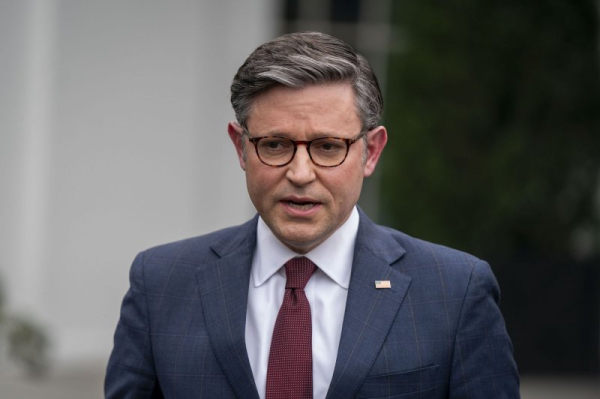Pitting the border against aid for Ukraine is a fool’s choice

Speaker of the House Mike Johnson, R-LA, speaks to the press after meeting with President Joe Biden, Vice President Kamala Harris, Senate Majority Leader Chuck Schumer, D-NY, House Minority Leader Hakeem Jeffries, D-NY and Senate Minority Leader Mitch McConnell, R-KY, in the Oval Office of the White House in Washington, DC on Tuesday, February 27, 2024. Photo by Bonnie Cash/UPI | License Photo
America’s government and politics have long lost the ability for rational debate.
The current crisis over how to “fix” the border and provide vital aid to Ukraine could not be more relevant. House Republicans, led by Speaker Mike Johnson, R-La., who many believe has become Donald Trump’s puppet, argue that the border crisis must be addressed as the first priority before dealing with Ukraine. Advertisement
The oath of office for Congress shows why this political standoff is based on a fool’s choice. Specifically members “solemnly swear (or affirm) …to… support and defend the Constitution of the United States against all enemies, foreign and domestic…” While no priorities are set between foreign and domestic, it was no accident which came first.
The border will not be “fixed” in the short term, no matter the legislation. The last major immigration reform was made in 1986. And dealing with the many millions of migrants in the United States, legally or not, and so-called “sanctuary cities,” where crowding due to migrants has reached crisis proportion, must take time. Advertisement
About Ukraine, the return to isolationism, reminiscent of the 1930s, has broken out within the Trump-dominated Republican Party. The quaint and misguided thinking is that Europe should be able to defend itself against Vladimir Putin’s Russia. Despite the European Union and NATO, there is no “Europe.” The presence of the United States has indeed given “Europe” a leader about which to band.
In the 1930s, the world could not have been more different from today. The United States, like most European states, was powerfully affected by World War I. But the United States had not suffered the destruction and deaths that made foreign states unwilling to engage in another war. The United States had turned inward. That FDR’s Lend Lease and renewal of the draft bills passed by single votes in Congress reinforced the strength of the nation’s isolationist mood.
It took Pearl Harbor to shock the nation back to a state of reality. Whether or not the Russian invasion of Ukraine is a 21st century version of Pearl Harbor, it has motivated NATO and the EU to act in response to Russia’s attack. Now, NATO members are openly discussing the likelihood of a Russian attack against the alliance, with some suggesting a compressed timetable of several years for that to occur. Advertisement
Trump has added political nitroglycerin to those concerns with his off-the-cuff comment that Putin “can do whatever the hell they want” after threatening that the United States would not defend NATO if members do not spend more on defense. From a Ukrainian perspective, a Trump presidency would likely end all aid, although if or when the current package goes through Congress, it may well be the last.
Why can’t Johnson understand that the border crisis and Ukraine spending are not either-or issues? Then suppose the aid package dies. The consequences for Ukraine would be disastrous. While Europe is trying to fill the gaps, particularly in artillery and air defense munitions, it lacks the capacity of the United States.
Ukraine would have two impossible choices: continue the war or negotiate. Its ability to wage war would shift to defense against a determined Russian enemy. Ukraine could be forced to increase strikes inside Russia as its only offensive option. That could lead to Russian escalation and the threat of using nuclear weapons.
Ukraine would be forced to lower the draft age to 20 or even 18 to use the increase of manpower to compensate for the lack of firepower. This would produce even far greater Ukrainian casualties. And if the fronts collapsed, Ukraine could wage a guerrilla war. Each of these possibilities is grim. Advertisement
Putin and Russia would be empowered. While rebuilding a depleted army will probably take much longer to accomplish, NATO and EU members would not rely on that alone for determining policy. Whether this would force an accommodation with Moscow is not impossible. But NATO would be weakened as U.S. reliability would be questioned.
John F. Kennedy’s cynical comment that the only fate worse than being an enemy of the United States was being a friend. That would ring true in Europe. And no matter how much President Joe Biden embraces NATO, money, not promises, counts more.
Perhaps common sense will prevail this week. But because the border presents for Republicans perhaps the single issue to decide the presidential elections in November, no incentive exists for compromise. The pursuit of power will trump all else. And the consequence will be that domestic enemies have become far more dangerous than foreign ones.
Harlan Ullman is UPI’s Arnaud de Borchgrave Distinguished Columnist, a senior adviser at Washington’s Atlantic Council, the prime author of “shock and awe” and author of “The Fifth Horseman and the New MAD: How Massive Attacks of Disruption Became the Looming Existential Danger to a Divided Nation and the World at Large.” Follow him @harlankullman. The views and opinions expressed in this commentary are solely those of the author. Advertisement